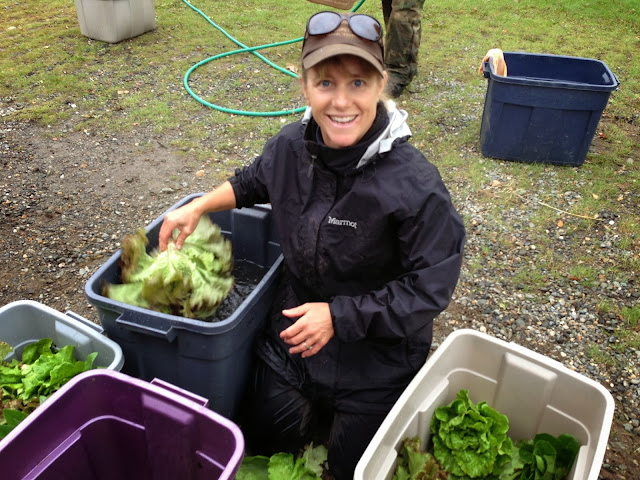 |
| Growing produce for Denali Park hotels. This is Laura, who operates a produce supply company, with her partner, Jimmie. |
Simple Truck Gardens Near Denali Park Bring Quality Food To Local Restaurants
Fresh food has always been a problem in Alaska, especially fresh produce. One of the drawbacks to growing vegetables are the cold temperatures that this subarctic state dishes up to the would-be gardener.
To most Americans, Minneapolis and St. Paul are generally considered to be "cold." And Minnesota is somewhat chilly. The Twin Cities average around 45 degrees above zero, year-round.

But, in Denali National Park, the average year-round temperature is below freezing: 28 degrees. This is considerably less than Minneapolis, and way less than the national U.S. average of 54.5 °F!
The problems of trying to grow crops outdoors in a place that is this cold are considerable. Although Alaska is known for its huge cabbages, which are grown south of Denali Park in the Palmer area, even cabbages can be tricky to grow, and require special, secret care and growing techniques. ("Secret" -- because the growers of the biggest crops are honored annually at the Alaska State Fair, and their inside knowledge of how they do it stays in the family.)
As a result of Alaska's extreme weather, you'll often spot small plastic greenhouses in people's yards, to give the plants a leg up by trapping heat.
The daylight hours in Alaska during the summer are incredibly long, by Lower 48 standards. In late June, Denali Park has a 20 hour, 49 minute day. This helps the growing season a lot. But not if it's raining, and ice water is sprinkling down out of the clouds onto the crops. Or if it's August and it's freezing. Here -- just north of Denali Park at Tatlanika -- it's remarkable that Laura (above) has such a beautiful truck garden to supply the restaurants nearby. But, those extra miles headed north of Denali are critical. It's much warmer in Nenana and Fairbanks in the summer than at Denali.
But there's one good thing about planting in Alaska. There are very few garden bugs and pests bothering wilderness gardens. That's because they have no lifeline from one distant settlement in the wilderness to another, and can't cross hundreds of miles of untilled spruce and scrub. And because bugs, too, flourish in warmer climes.